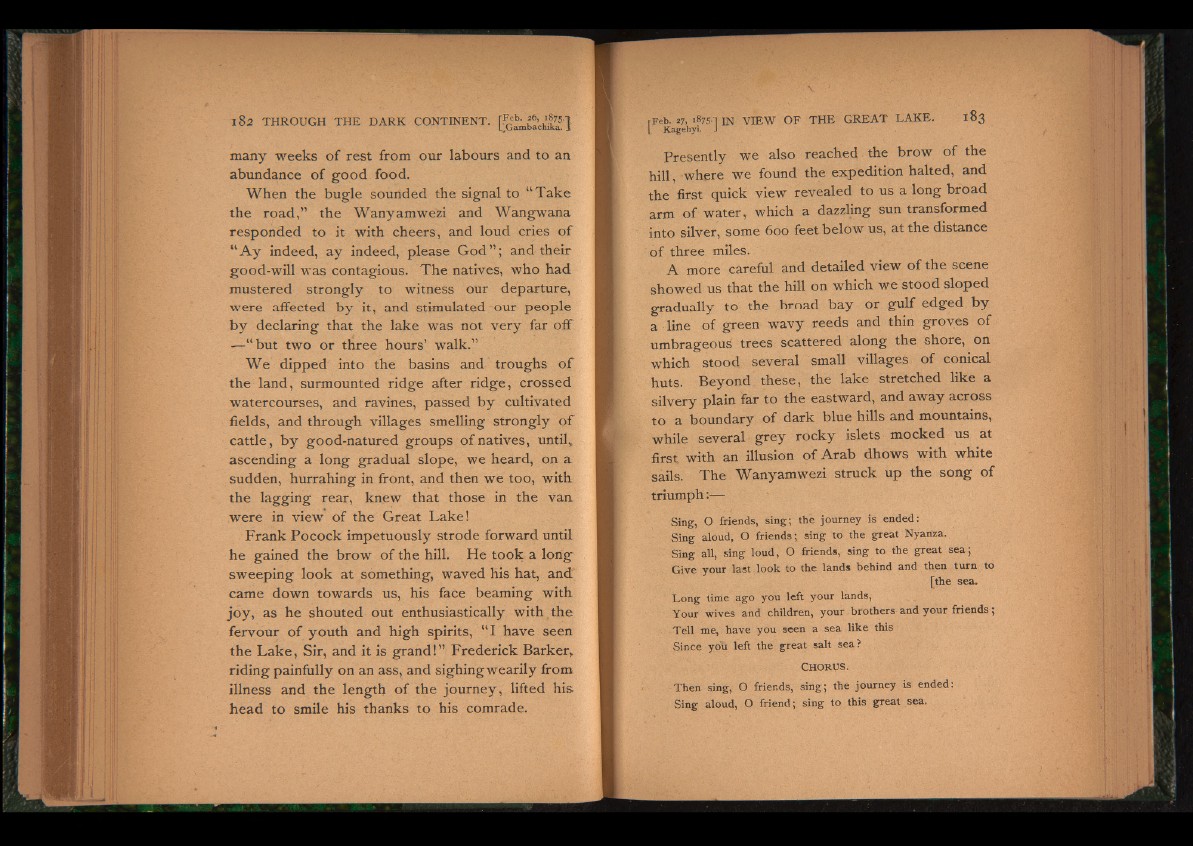
many weeks o f rest from our labours and to an
abundance o f g o od food.
When the bugle sounded the signal to “ T a k e
the ro ad ,” the Wanyamwezi and Wangwana
responded to it with cheers, and loud cries o f
“ A y indeed, a y indeed, please G o d ” ; and their
good-will was contagious. T he natives, who had
mustered strongly to witness our departure,
were affected b y it, and stimulated our people
b y declaring that the lake was not ve ry far o ff
— “ but two or three hours’ walk.”
W e dipped into the basins and troughs o f
the land, surmounted ridge after ridge, crossed
watercourses, and ravines, passed b y cultivated
fields, and through villages smelling strongly o f
cattle, b y good-natured groups o f natives, until,,
ascending a long gradual slope, we heard, on a
sudden, hurrahing in front, and then we too, with
the lugging rear, knew that those in the van
were in view o f the Great Lake!
Frank Pocock impetuously strode forward until
he gained the brow o f the hill. He to ok a long"
sweeping lo o k at something, waved his hat, and
came down towards us, his face beaming with
jo y , as he shouted out enthusiastically with the
fervour o f youth and high spirits, “ I have seen
the L a k e , Sir, and it is grand!” Frederick Barker,,
riding painfully on an ass, and sighingwearily from
illness and the length o f the journey, lifted his
head to smile his thanks to his comrade.
rF e b . 27» 1875-1 IN VIEW OF THE GREAT LAKE. 183
L Kagehyi. J
Presently we also reached the brow o f the
h ill, where we found the expedition halted, and
the first quick view revealed to us a long broad
arm o f water, which a dazzling sun transformed
into silver, some 600 feet b elow us, at the distance
o f three miles.
A more careful and detailed view o f the scene
showed us that the hill on which we stood sloped
gradually to the broad b a y or gu lf edged b y
a line of green w a v y reeds and thin groves o f
umbrageous trees scattered along the shore, on
which stood several small villages of conical
huts. Beyond these, the lake stretched like a
silvery plain far to the eastward, and aw ay across
to a boundary o f dark blue hills and mountains,
while several g re y ro ck y islets mocked us at
first with an illusion o f A rab dhows with white
sails. The Wanyamwezi struck up the song o f
triumph:—
Sing, O friends, sing; the journey is ended:
Sing aloud, O friends; sing to the great Nyanza.
Sing all, sing loud, O friends, sing to the great sea;
Give your last. look to the lands behind and then turn to
[the sea.
Long time ago you left your lands,
Your wives and children, your brothers and your friends;
Tell me, have you seen a sea like this
Since you left the great salt sea ?
CHORUS.
Then sing, O friends, sing; the journey is ended:
Sing aloud, O friend; sing to this great sea.